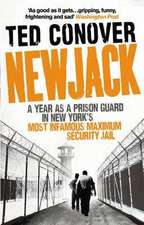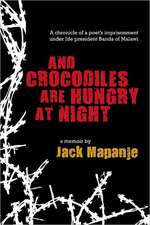The Future of Imprisonment
Editat de Michael Tonryen Limba Engleză Paperback – 22 iul 2006
Preț: 239.22 lei
Preț vechi: 265.55 lei
-10% Nou
Puncte Express: 359
Preț estimativ în valută:
45.78€ • 47.89$ • 38.03£
45.78€ • 47.89$ • 38.03£
Carte tipărită la comandă
Livrare economică 22-28 martie
Preluare comenzi: 021 569.72.76
Specificații
ISBN-13: 9780195314106
ISBN-10: 0195314107
Pagini: 272
Ilustrații: 8 halftones
Dimensiuni: 156 x 235 x 18 mm
Greutate: 0 kg
Editura: Oxford University Press
Colecția OUP USA
Locul publicării:New York, United States
ISBN-10: 0195314107
Pagini: 272
Ilustrații: 8 halftones
Dimensiuni: 156 x 235 x 18 mm
Greutate: 0 kg
Editura: Oxford University Press
Colecția OUP USA
Locul publicării:New York, United States
Recenzii
The Future of Imprisonment is a valuable contribution to our understanding of how a malignant institution has not only endured in the United States, but thrived. Unlike many edited collections, the contributions are of a uniformly high standard and their reach is broad. There is plenty here to interest both penologist and policy maker, and while the current political context does not inspire great confidence, this book provides a route map for reform, should circumstances change.
This book should be required reading for persons involved in imprisonment social policy. Highly recommended.
Reasoned and data-driven, The Future of Imprisonment provides a bridge between the great tradition of 20th Century criminology and the sophisticated analysis of the new century. Balanced and with a clear moral vision, the collection offers sophisticated insights into the uses and misuses of the incarcerative sanction.
I strongly recommend this collection of essays for anyone interested in corrections but particularly for correctional administrators. Its reading will lead you to critically examine many of your basic beliefs about the current policies of imprisonment. One will also come away with a greater appreciation of the influence Norval Morris has had on correctional thinking.
Prisons are absorbing an ever increasing portion of our state and federal resources, yet the hoped-for results of imprisonment continue to elude our grasp. In updating the 1974 work of Norval Morris, Michael Tonry has developed some powerful themes. Prisons are necessary, but better results can, and should be, achieved with a more thoughtful and systematic approach for individual offenders through rational sentencing, continued improvement in prison life, and ultimately, a successful re-entry into the community. An impressive collection of thinkers and theories that all policy makers should consider when undertaking the important responsibility of punishing our society's law breakers.
There are a number of insightful and thought-provoking essays in this edited volume that have a great deal to offer to those studying the myriad questions surrounding how we should decide who goes to prison and for how long, how we should treat prisoners while incarcerated, and what should be the basis for their release.
This book should be required reading for persons involved in imprisonment social policy. Highly recommended.
Reasoned and data-driven, The Future of Imprisonment provides a bridge between the great tradition of 20th Century criminology and the sophisticated analysis of the new century. Balanced and with a clear moral vision, the collection offers sophisticated insights into the uses and misuses of the incarcerative sanction.
I strongly recommend this collection of essays for anyone interested in corrections but particularly for correctional administrators. Its reading will lead you to critically examine many of your basic beliefs about the current policies of imprisonment. One will also come away with a greater appreciation of the influence Norval Morris has had on correctional thinking.
Prisons are absorbing an ever increasing portion of our state and federal resources, yet the hoped-for results of imprisonment continue to elude our grasp. In updating the 1974 work of Norval Morris, Michael Tonry has developed some powerful themes. Prisons are necessary, but better results can, and should be, achieved with a more thoughtful and systematic approach for individual offenders through rational sentencing, continued improvement in prison life, and ultimately, a successful re-entry into the community. An impressive collection of thinkers and theories that all policy makers should consider when undertaking the important responsibility of punishing our society's law breakers.
There are a number of insightful and thought-provoking essays in this edited volume that have a great deal to offer to those studying the myriad questions surrounding how we should decide who goes to prison and for how long, how we should treat prisoners while incarcerated, and what should be the basis for their release.
Notă biografică
Michael Tonry is one of the nation's most respected experts on crime and punishment. The author of the highly acclaimed Malign Neglect and (with Norval Morris) Between Prison and Probation, he is director of the Institute of Criminology, Cambridge University, and Sonosky Professor of Law and Public Policy at the University of Minnesota. He has worked as an advisor to federal and state agencies in the United States, Australia and Canada, to national governments in Europe, and to international organizations. CONTRIBUTORS INCLUDE: Alfred Blumstein Jeffrey Fagin Richard S. Frase James Jacobs Marc Miller John Monahan Kevin R. Reitz Michael Tonry Franklin E. Zimring















